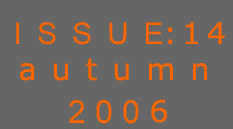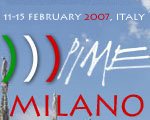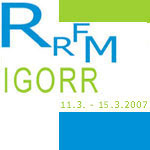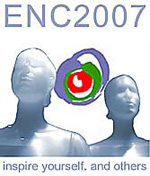
Interview of Eric Van Walle, new Head of SCK-CEN
Q1. The nuclear revival
is in full swing, with some European countries reversing their
nuclear phase-out policies and others expanding or opting for
nuclear for the first time. Within this context, what are, in
your view, the major challenges facing SCK•CEN? How do you
see things evolving in the near future?
| 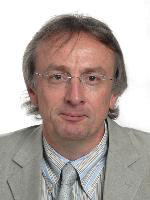
Eric Van Walle
|
As you know,
we have by law a nuclear phase out scenario in Belgium that
will start with the closure of the Doel I/II and Tihange
I power plants in 2015. We expect, however, that Belgium
too will have to renounce its phase out and that the dossier
will be high on the political agenda by next year. Although
SCK•CEN tries to remain objective and not to take
any position on the political dimensions of this dossier,
we cannot hide the fact that reversing the current policy
would have a positive impact on SCK•CEN’s activities.
It is clear that if a changed attitude towards nuclear were
to be adopted this would |
have a positive impact on R&D in the nuclear
energy domain and on the educational projects that we run as part
of our portfolio of activities.
Q2. As a state-run research
institute, the work and objectives of SCK•CEN must, inevitably,
be influenced by political change in Belgium. With elections in
Belgium just around the corner, to what extent do you think that
a change of government might impact upon the current work and
future direction of research at SCK•CEN?
First of all SCK•CEN is not a state-run
business: we are government supported and need to fulfil certain
obligations that are mentioned in our statutes. These statutes
are rather well-defined but also allow us to carry out other activities
as long as they are related to nuclear energy matters. SCK•CEN
tries to be objective in its evaluations and communications: as
such we are not influenced by political change, but we can be
requested to look into extra matters (or the opposite). On the
other hand we have our 'own income' from extra research or service
related work. Here we have much more freedom to choose the directions
in which we invest our resources.
Q3. The research community
in Europe is experiencing increasing competition from Eastern
Europe. Is a more competitive marketplace a good thing or a bad
thing for European research in general and for Belgian research
in particular? Are they really competitors, or is it more a case
of exploiting synergies, pooling resources and sharing experiences
and expertise?
We are not afraid of competition as long as it
is fair competition. At present, the competition is unfair as
far as money is concerned (especially when it comes to salaries!)
but we can compete because of the quality and knowledge-based
contributions we can make to the projects. It is clear that many
of the former Eastern European countries are improving their overall
standards and exploiting synergies will become increasingly more
important: this is already apparent in many European projects.
So, we will have to reach agreements as how to effectively pool
resources and promote complementarity.
Q4. SCK•CEN has been
carrying out extensive research into the merits of Boom clay as
a safe and efficient medium for the deep underground storage of
radioactive waste. Do you think a European country will finally
succeed in starting up a large-scale underground repository operation
in the near future and isn’t Belgium playing a leading role
in making this a reality one day?
Several projects are already well under way right
now. In France, for example, work is ongoing 500m deep underground
at the experimental gallery at Bure. However, Belgium has always
had played a pioneering role in the research and development of
waste disposal in clay formations and has set the standards in
this area. The interest shown in this Belgian experiment is worldwide
and has led to spin-offs both in the past and today (including
research carried out by the IAEA and international consultancy).
Will final disposal in clay ever happen? This is partly a political
decision because retreated vitrified high level waste (HLW) still
needs to cool down for at least 50 years before it can be put
into a final repository. So, the final “reality” of
Boom clay disposal may still be some years away … which
does not mean that research has been finalised, on the contrary,
it still keeps us busy.
Q5. The medical isotope
business continues to develop largely free of the controversy,
public opposition and anti-nuclear NGO focus that have traditionally
accompanied the nuclear power industry. How do you see research
in the medical applications of nuclear technologies progressing
in the short and medium term? The medical and diagnostic business
should help enhance the overall image of nuclear energy, but is
this the case?
| The
medical radio-isotope business is an important business
area for SCK•CEN in both the short and long term.
There is an increasing demand for it, which will increase
the capacity of our work in BR2 and help launch further
research projects. We also believe that society should see
in a better way the considerable healthcare benefits that
can be gained from the medical isotope business. This can
only be positive for the image of nuclear energy applications
in general. Other applications not related to BR2 include,
for example, “hadrontherapy,” which we believe
might deliver increasingly important healthcare benefits
in Belgium in the years to come. |
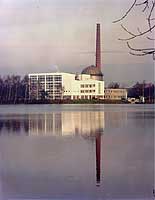
SCK•CEN (Belgian Nuclear Research
Centre), Mol
|
Q6. The continuing decline
of interest among young people in studying the sciences and in
pursuing a career in research is often highlighted in the media.
Why do the sciences appear to be so unattractive to many young
people? As a centre of excellence, SCK•CEN offers a number
of education and training projects. Could you explain what the
main objectives and activities of these programmes are?
Well I think this situation is now gradually
changing – and for the better. The natural sciences are
beginning to make a come-back after a decline that was largely
'sponsored' by the loss of interest in nuclear energy issues.
SCK•CEN together with 6 Belgian universities have put in
place and organise at SCK•CEN the Belgian Higher Nuclear
Education Network. Its purpose is to promote continuous education
and applied training in a range of nuclear physics related applications
and to develop the necessary bank of skills and technical expertise
required to build a platform for talented young Belgians to pursue
a successful career in nuclear engineering and related fields.
SCK•CEN also offers an ongoing programme of training courses
and exchange programmes with young PhD scientists and physicians
from eastern European and emerging countries, who work in our
Mol laboratories in a range of applied fields. These reflect the
importance that we attach to training, education, sharing experiences
and developing synergies with other countries. They also show
the international network of contacts that we have developed and
emphasise our international and forward-looking approach.
Similar initiatives are also being pursued in
other countries. So, the “scientific education deficit”
that has been so apparent across Europe in recent years is gradually
being corrected. SCK•CEN’s efforts in this area are
bearing fruit. Only by refuelling interest in the natural sciences
among young people through education - at all levels, from secondary
schools to post-graduate university studies - can we ensure the
reservoir of talent, commitment and youthful dynamism that will
be needed to sustain and drive forward the nuclear revival.
Q7. SCK•CEN is involved
in societal research that aims to improve dialogue and interaction
with local communities and stakeholders on nuclear issues –
particularly with regard to safety, waste and risk management.
Could you describe briefly what this work involves and the benefits
it brings? To what extent do you feel that this work enhances
public perception of nuclear?
The PISA research programme that SCK•CEN
is carrying out , which has concentrated on the integration into
and impact upon nuclear research of social sciences and societal
issues, focuses upon the involvement of key relevant actors and
stakeholders - such as the local communities in Mol and Dessel-
in the decision-making process relating to nuclear waste disposal.
This combines risk governance approaches with enhanced dialogue.
PISA has also analysed the prevailing safety
culture at our own installations, as well as liability issues
linked to nuclear legislation. We also questioned our own experts
and the public to learn more about risk behaviour patterns. A
pre-condition for influencing public attitudes towards nuclear
technology is to first gain a better insight into differing risk
perceptions. This is what we aim to achieve from the Belgian version
of the IRSN risk barometer survey.
Q8. The work that you carry
out into ways of continually improving safety standards within
the nuclear industry reflects SCK•CEN’s mission to
protect mankind and the environment. It has led to a number of
collaborative projects with international bodies like the IAEA
and IRE (the National Institute for Radio-elements). Could you
highlight one of these initiatives and explain how it has produced
results?
SCK•CEN has been involved in many projects
related to standardisation. It actively participates in the development
of safety standards for operational NPP's through its involvement
with ASTM and USNRC (Belgium follows, to a large extent, the example
of US legislation). The reason for this participation is twofold:
firstly, it is a statutory obligation and secondly, it also is
also a way of establishing the contacts needed to obtain contractual
work related to reactor safety assessments. Another example of
collaboration with international bodies is the continuous and
very active interaction that SCK•CEN has with the IAEA –
in particular, participation in many safety related commissions,
as well as several CRP (Concerted Research Projects); In addition,
we have been asked by the IAEA to perform expert assignments with
regards to safety and other issues.
Q9. Many of SCK•CEN’s
research programmes are carried out within the framework of the
EU’s 6th Framework Programme. In your opinion, what new
initiatives will emerge from the 7th Framework Programme-
or will it be simply a case of status quo?
We sense that the EU is putting more and more
emphasis on the fact that they consider that plant owners (stakeholders,
end-users) are ultimately responsible for the financial input
needed to carry out their research programmes. As such, the EU
concentrates more on bringing different groups together to bring
about a more integrated European research scenario. In reality,
we believe that FP7 will largely promote continuity with regards
to existing FP6 programmes and ideas. We hope that future research
projects will receive adequate funding to create the necessary
basis for fully-fledged and effective research projects to emerge.
Thank you Mr. Van Walle (interview conducted
by Mark O’Donovan)
|

